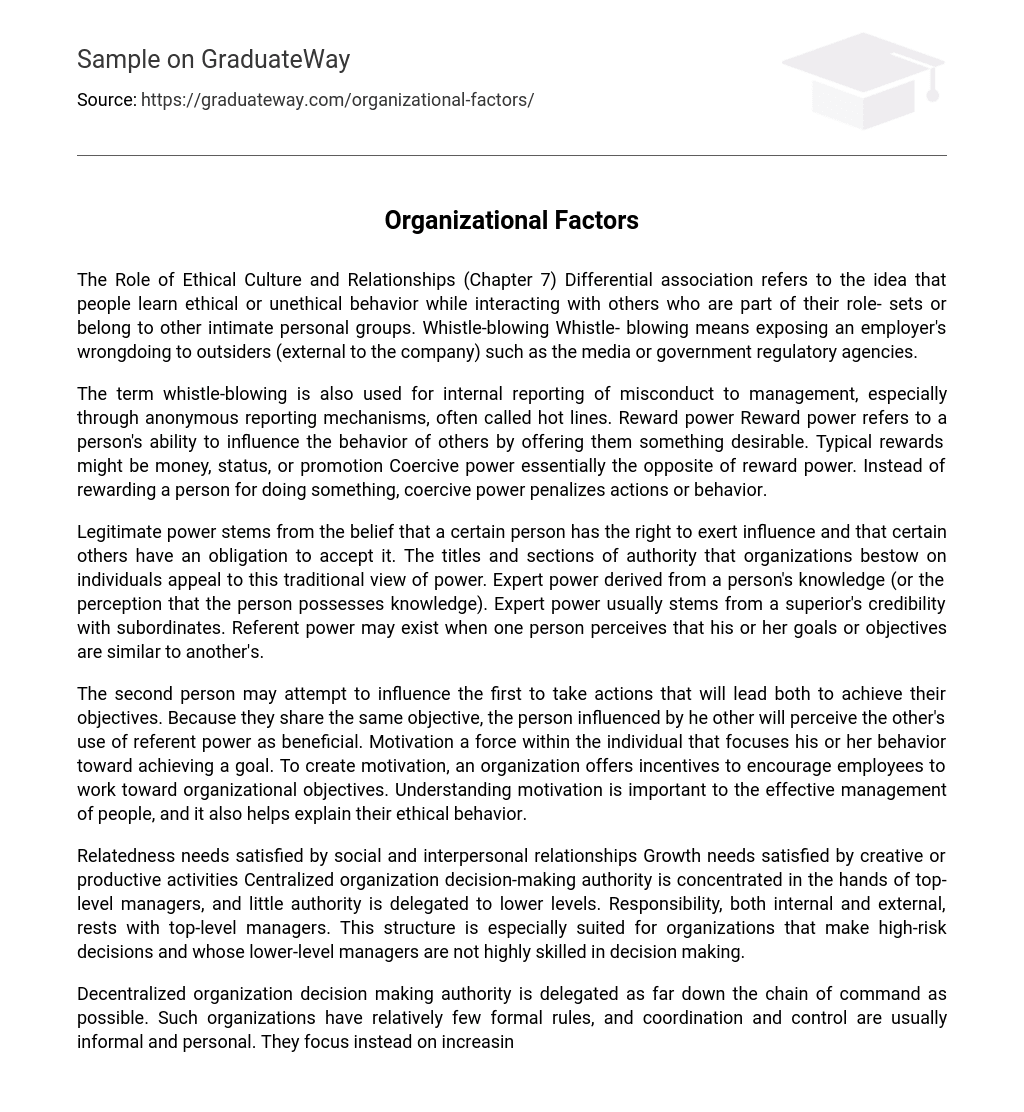The Role of Ethical Culture and Relationships (Chapter 7) involves the concept of differential association, which states that individuals acquire knowledge of ethical or unethical behavior through interactions with others in their role sets or intimate personal groups. Whistle-blowing is the act of revealing an employer’s misconduct to external entities, such as the media or government regulatory agencies.
The concept of whistle-blowing is also applicable to reporting misconduct internally to management, particularly through anonymous reporting mechanisms commonly known as hot lines. Reward power involves a person’s capacity to influence others’ behavior by providing them with desirable things such as money, status, or promotion. Conversely, coercive power functions by penalizing actions or behavior instead of offering rewards.
Legitimate power originates from the belief in a person’s entitlement to exert influence and others’ obligation to accept it. The titles and sections of authority given by organizations to individuals support this conventional perspective on power. Expert power is based on a person’s knowledge (or the perception of their knowledge). Expert power typically arises from a superior’s credibility with subordinates. Referent power can exist when one person perceives a similarity between their goals or objectives and another’s.
The second individual may try to persuade the first person to take actions that will result in both of them achieving their goals. Since they have the same objective, the person being influenced will see the other person’s use of referent power as advantageous. Motivation is an internal force that directs an individual’s behavior towards achieving a goal. To foster motivation, an organization provides incentives to motivate employees to work towards organizational objectives. Having a grasp of motivation is crucial for managing people effectively and it also aids in comprehending their ethical behavior.
Social and interpersonal relationships are needed to fulfill relatedness needs. Creative or productive activities are necessary to satisfy growth needs. In a centralized organization, decision-making authority is concentrated in the hands of top-level managers, with little delegation to lower levels. Top-level managers hold responsibility, both internal and external. This structure is particularly suitable for organizations that make high-risk decisions and have lower-level managers lacking strong decision-making skills.
Decentralized organizations delegate decision-making authority as low in the chain of command as possible. These organizations have few formal rules and rely on informal and personal coordination and control. Their focus is on enhancing information flow. Formal groups are assemblies of individuals with an explicitly accepted organized structure. Informal groups consist of two or more individuals sharing a common interest but lack an explicit organizational structure. Group norms are the behavioral standards expected from group members.
The influence of corporate culture on business ethics is similar to how group norms define behavior within a group. Corporate culture encompasses the behavioral patterns, concepts, values, ceremonies, and rituals within an organization. It provides members with meaning and sets internal rules of behavior. Corporate culture establishes guidelines for acceptable conduct just as group norms define the acceptable limits for deviation from group expectations.
Organizational culture, also referred to as corporate culture, is developed within a company through the acceptance and sharing of values, beliefs, customs, rules, and ceremonies. Ethical decision making in organizations is greatly influenced by leadership, power, and motivation. Organizational leaders utilize their power and influence to shape the corporate culture which ultimately affects ethical decision making. Power pertains to the control exercised by leaders and managers over the behavior and choices of subordinates.
The exertion of power has the ability to impact others and their ethical decision-making framework. There are five power bases that can be utilized to influence individuals: (1) reward power, (2) coercive power, (3) legitimate power, (4) expert power, and (5) referent power. These power bases possess the potential to ethically or unethically motivate individuals. It is crucial for a leader to possess the capability to motivate subordinates in order to uphold an ethical organization.
To promote motivation, organizations offer incentives to encourage employees to work towards the objectives of the organization. Understanding motivation is crucial for effective people management and helps clarify ethical behavior. The influence of work groups on ethical decision-making is significant. Work groups play a key role in dividing responsibilities within specific functional areas of a company and serve as the foundation for group decision-making. A major obstacle preventing individuals from implementing their own ethical beliefs in organizations is the collective decision-making process of work groups.
Those who possess legitimate power are able to influence ethics-related activities, as the work group and team have the ability to sanction certain activities as ethical or label others as unethical. The connection between individual and group ethical decision making is often questioned, as some find it difficult to believe that an organization’s culture can have such a significant impact on individuals’ behavior within the organization. In our society, we prefer to believe that individuals have control over their own destiny.
Business ethics is commonly perceived as a manifestation of the diverse moral philosophies employed by individuals in resolving their own moral predicaments. Nonetheless, decision-making pertaining to ethics within organizations typically involves committees and both formal and informal groups, rather than individual efforts. Matters concerning financial reporting, advertising, product design, sales practices, and pollution-control matters are often beyond the reach of individual influence. Furthermore, these decisions are frequently driven by business objectives rather than personal motives.





